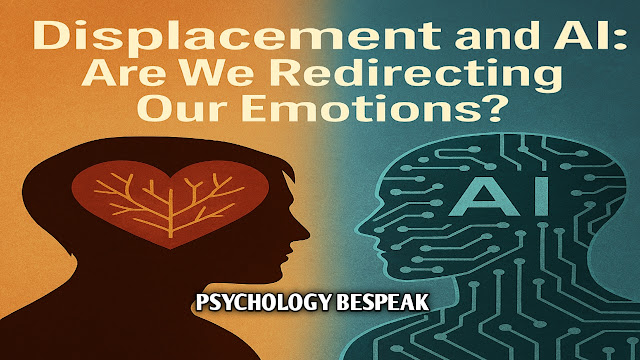INTEGRATIVE APPROACHES TO PSYCHOPATHOLOGY: THE BIO-PSYCHO-SOCIAL MODEL DR. GEETANJALI PAREEK|
Thank you everyone for
viewing this blog, liking it, sharing it, sending your comments and subscribing
to the blog and letting it fulfill the purpose for which it was made.
For
more articles:
Ø Want to know more about
Left handedness and Right handedness than- Left
Vs Right
Ø If you are facing the
difficulties in managing stress during this covid times than sure to read this
-Combating
Stress During Covid Times
Ø Having difficulties in
managing anger- Anger
Mangement
Ø Poster
on Covid-19 by Students during Lockdown
Ø Keep
Moving Even When The World Says NO
Ø ARE
YOU READY FOR TRANSFORMATION OF YOUR LIFE? Ever
Powerful OM
Ø Want to know the secret
of being winner TO
BE A WINNER BE DEAF TO NEGATIVITY
Ø Feeling depressed, sad,
feel empty or worthless and want to be out of it BRIGHTER
SIDE OF LIFE
Ø Finding difficulty in
managing time BENEFITS AND TECHNIQUES OF TIME MANAGEMENT
Ø What is more important
time or money TIME
VS MONEY
Ø Want to learn more about
Psychopathology PSYCHOPATHOLOGY
Ø Want to know more about
Anxiety Disorder ANXIETY
DISORDER
Ø GENERALIZED
ANXIETY DISORDER
Ø SOCIAL ANXIETY DISORDER/ SOCIAL PHOBIA
For
FREE Career Counselling read:
Ø To know more about
Career
in Medicine
Ø To know more about
Career
in Engineering
Ø To know more about
Career
in Business Management/MBA
Ø To know more about
Law Order
Order
For
those who enjoy listening can listen to my podcast also
Podcasts :
2.
https://anchor.fm/dr-geetanjali-pareek/episodes/The-Boiling-Frog-Syndrome-eihpjt
3.
https://anchor.fm/dr-geetanjali-pareek/episodes/Benefits-and-Techniques-of-Time-Management-ejk1tl
4.
https://anchor.fm/dr-geetanjali-pareek/episodes/Anxiety-disorders-ek9rp0
5.
https://anchor.fm/dr-geetanjali-pareek/episodes/Generalized-Anxiety-Disorder-el7jie
6.
https://anchor.fm/dr-geetanjali-pareek/episodes/TIME-VS-MONEY-el0dvk
7.
https://anchor.fm/dr-geetanjali-pareek/episodes/Panic-Disorder-elfeub




Comments
Post a Comment